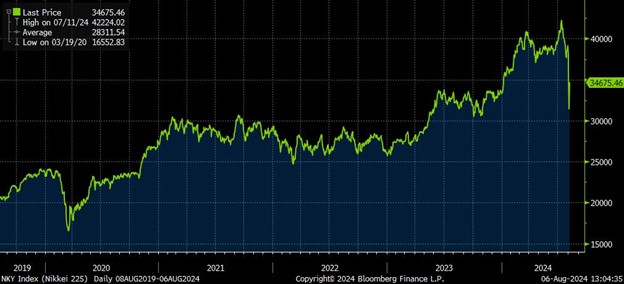In just three trading days, the Nikkei 225 index, which tracks the 225 largest companies on the Tokyo Stock Exchange, fell over 20% as it had its worst day since 1987. The constituents of this index have a market cap of $4 trillion, translating to a near decline in value of $1 trillion in three days. This drop also erased all gains made since the beginning of this year. As of the writing of this note, the market has recovered about half of that loss. Nvidia, one of the best performing technology companies of the past two years, has seen its stock price fall from a high of $140.76 on June 20 to just below $100 by August 5, resulting in a loss of $1 trillion in value.
What should we make of this situation?
Nikkei 225 Index

Source: Bloomberg Finance L.P.
Nvidia

Source: Bloomberg Finance L.P.
Large movements in share prices occur unexpectedly. If they were easily predictable, they wouldn’t happen as market participants would have sold ahead of time. Afterwards, market pundits are great at identifying the reasons why they occurred. This time, concerns over unprofitable and perhaps unsustainable spending by the mega-cap tech firms to build out Artificial Intelligence capabilities have been cited. Oddly, very few investors seemed overly concerned about this issue when Nvidia’s share price climbed from $85 to $140 in late May and early June. Additionally, a weaker than expected US labour market report released last Friday raised fears that the US was about to enter a recession and the Federal Reserve (Fed) had waited too long to begin cutting rates. Many market participants called for an immediate rate cut by the Fed, which is not going to happen. The Fed’s mandate is not to ensure that the stock market rises.
The unwinding of the Japanese yen-funded carry trade added to the stresses in the system when Asian markets opened on Monday morning. This strategy involves borrowing in yen to invest in higher-yield assets. Due to the Bank of Japan’s recent move to hike interest rates, some traders have been forced to exit their yen-funded positions, adding to what was already a volatile situation following Friday’s US jobs numbers.
Regardless of why the sell off happened, it has happened. Should you be doing anything to your portfolio? There is a strong temptation to buy what may appear to be bargains or conversely to sell some big losers out of fear and frustration, just to feel proactive.
If you hold quality fixed-income holdings (as you should), take some comfort. Fixed-income markets saw yields fall sharply in response to equity price declines, and for the first time in years provided a nice offset.
Our portfolio positioning reflects our cautious view on the mega-cap technology stocks, considering their stretched valuations, as well as the potential for political uncertainty in the US in the lead up to the November election. However, we view this move downwards as a correction (one we have been calling for over the last few months), rather than the end of the bull market. Expect a bumpy few months ahead.

